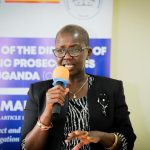Mr. Joel Ssenyonyi, the Leader of the Opposition in Parliament, delivered a message emphasizing the importance of accepting criticism as a fundamental aspect of effective leadership in a recent symposium held in Kampala. Ssenyonyi highlighted that without the willingness to accept critique, leadership can easily slide into dictatorship and result in poor governance.
He underscored the significance of utilizing online platforms, digital spaces, and social media for sharing ideas and engaging with diverse audiences. However, Ssenyonyi lamented that instead of embracing these platforms, the government has opted to suppress them, citing the ban on Facebook as an example. He emphasized that leaders must be prepared to face criticism and engage with dissenting voices, asserting that defending the rights of those who disagree is essential for effective leadership.
The remarks were made during the second annual national youth symposium, which focused on redefining governance and political inclusivity in Uganda. The symposium aimed to gather insights to reform the governance system, advocating for proportional representation to diversify and strengthen the political landscape. Additionally, it addressed issues such as gender-based violence in politics and measures to enhance women’s participation.
Phiona Nyamutoro, chairperson of the Uganda Parliamentary Forum on Youth Affairs (UPFYA), emphasized the importance of inclusivity for young people in political participation. She stressed the need for open civic spaces and access to information to empower youth to contribute meaningfully to addressing societal challenges.
Fred Mukasa Mbidde, Deputy President of the Democratic Party, critiqued Uganda’s democratic landscape, highlighting discrepancies between periodic elections and the actual representation of the populace. He criticized the political environment, describing it as more akin to a cult than a true democracy, with power centralized around President Museveni.
Primus Atukwatse Bahigi, Country Director of the Netherlands Institute for Multiparty Democracy (NIMD), emphasized the importance of political inclusiveness in governance. He asserted that inclusivity should extend beyond mere competition for power, allowing all groups equal opportunity to influence policy and decision-making processes.
Rebecca Alitwala Kadaga, the First Deputy Prime Minister, emphasized the need to address patriarchal attitudes in politics. She called for collaboration between men and women, stressing the importance of representing all constituents regardless of gender.
With Uganda boasting one of the world’s youngest populations, comprising 78% under the age of 35, and 20.6% between 15 and 24 years old according to the 2014 national census, the symposium highlighted the critical role of youth in shaping the country’s future.




















